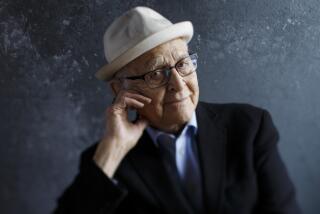Reginald Rose, 81; Writer Honored for ’12 Angry Men’
He wrote in longhand on yellow legal paper, and his scripts seared the pages.
His stories dealing with such issues as race relations, abortion and the right to die earned three Emmys, four Writers Guild of America awards, four additional Emmy nominations and an Academy Award nomination.
Reginald Rose, the writer best remembered for his study of jurors called “12 Angry Men,” which garnered many of those top awards, has died. He was 81.
Rose died Friday in a Norwich, Conn., hospital of undisclosed causes.
Drawing on his own experience serving on an all-white male jury in the early 1950s, Rose penned his versatile drama for television’s live dramatic anthology series “Studio One.” The play described how a single juror persuades his 11 colleagues, all determined to find a murder defendant guilty, that reasonable doubt exists and therefore the decision must be acquittal.
Presented in 1954, the remarkable drama earned Emmys for Rose for writing, for Frank Schaffner for directing and for Bob Cummings for acting as the pivotal Juror No. 8.
Rose also collected a Writer’s Guild of America Award for his script, and later an Oscar nomination for turning it into the 1957 motion picture starring Henry Fonda in the Cummings role. Rose and Fonda co-produced the film.
Rose turned the script into a play in 1964, which was first produced in London and has become a favorite of theater companies of various sizes over the years.
Rose also won two Emmys for the 1961-65 television series “The Defenders,” starring E.G. Marshall and Robert Reed as father and son lawyers. That series also stemmed from one of Rose’s original scripts for “Studio One,” which had been offered in two parts in 1957. That version starred Ralph Bellamy and William Shatner as the father and son legal eagles, defending a young Steve McQueen for murder.
Born in New York City, the son of a lawyer, Rose attended what is now the City University of New York and spent four years in the Army during World War II, rising to the rank of first lieutenant.
He began his career writing advertising copy and publicity with little success. But then he encountered the new medium of television when it was attempting to put plays into people’s living rooms.
“They had all these anthologies and they were desperate for scripts, absolutely desperate....” he told The Times in 1982.
“I had been trying to sell short stories, novels and God knows what else, and I never was able to sell anything. The first time I wrote a TV script I sold it, and when I sold that first one they said, ‘More, more, more!’ and I haven’t stopped since.
“In those years from 1953 to 1960, the writer was the star of the show. It was never to happen again.”
Despite Rose’s inroads, he was sometimes thwarted in his efforts to publicize controversial social struggles. In 1954, for example, he wrote “Thunder on Sycamore Street” for CBS’ “Studio One,” centered on what happened when a black family moved into a white neighborhood. But executives rejected that theme, and the newcomers became the family of an ex-convict.
Among Rose’s other works for television were “The Sacco-Vanzetti Story” and such miniseries as “Studs Lonigan” and “Escape from Sobibor.”
Rose wrote a handful of plays for the stage, including “This Agony, This Triumph,” based on his “The Sacco-Vanzetti Story” and first produced by the USC drama department in 1970.
He also found success in adapting many of his teleplays into motion picture scripts, beginning in the 1950s with “Dino” and “Crime in the Streets,” both dramas about social workers trying to help teenage delinquents, as well as the better-known “12 Angry Men.”
More recent movies included “The Wild Geese,” starring Richard Burton in 1978, and its sequel, “Wild Geese II,” starring Scott Glenn in 1985, and “Whose Life Is It Anyway?” a 1981 black comedy starring Richard Dreyfuss as a paralyzed man trying to legally end his life.
“In all my work,” Rose once said for the Dictionary of Literary Biography, “my main purpose has always been to project my own view of good and evil--and this is the essence of controversy.”
Divorced from his first wife, Barbara Langbart, Rose is survived by his second wife, the former Ellen McLaughlin, whom he married in 1963; and six sons, Andrew, Christopher, Jonathan, Richard, Steven and Thomas.
More to Read
The complete guide to home viewing
Get Screen Gab for everything about the TV shows and streaming movies everyone’s talking about.
You may occasionally receive promotional content from the Los Angeles Times.






